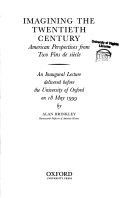Inaugural Lecture
1 total work
In his inaugural lecture, Professor Brinkley examines the writings of a wide range of literary, political, and other figures of the late 19th century who attempted to predict what the 20th century would be like. He argues that attempting to predict the future is a relatively new human activity, a product of (among other things) the Enlightenment and the industrial revolution and of the assumptions created by both of these that the future can be shaped by human intervention and that what once seemed fixed and eternal social and political structures are not timeless, but subject to rapid and fundamental change. He focuses on three areas of prediction that were of great importance at the last fin-de-siecle and remain of importance in the late 20th century: the impact of social and technological change, the relations among the classes in industrial society and the future of democracy.
